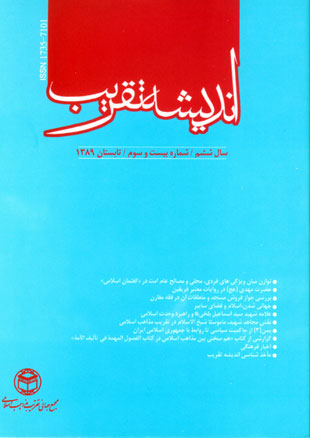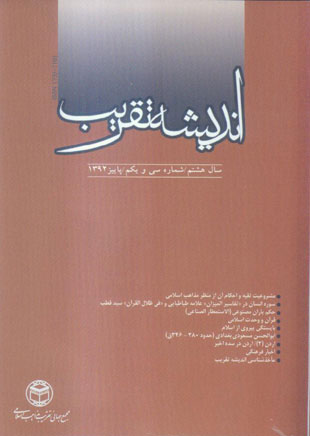فهرست مطالب

فصلنامه اندیشه تقریب
پیاپی 23 (تابستان 1389)
- 206 صفحه، بهای روی جلد: 5,000ريال
- تاریخ انتشار: 1389/10/20
- تعداد عناوین: 14
-
صفحه 5
- مقالات اندیشه ای
-
صفحه 59
- پیشگامان تقریب
- سرزمین های جهان اسلام
- گزارشی از یک کتاب
-
صفحه 157
- ماخذشناسی اندیشه تقریب
-
صفحه 191
-
صفحه 205
-
Page 11In the history of Islam exists interesting methods for establishing a rational and constructive dialogue. This article argues about the kind of Islamic dialogue used by Muslim thinkers as the disseminating medium and addressing Muslims’ culture and intellect clarifying position of Muslim’s civilization among other civilizations. The paper also critiques the relevant thinkers’ disseminating methods for achieving a balanced, rational, flexibleand wisdom-based religious dialogue.
-
Page 17Believing in Mahdaviat is a definite part of Islamic religions and the existing disagreements concerning the issue are only about its reference. The Sunnis have several Rewayat concerning the twelve caliphs; after assessing the Rewayat of Fariqin and their quotes, we reach the conclusion that the Rewayat mentioning twelve caliphs refer to the twelve Shiite Imams. Some of the Sunni traditions say that the name of Imam Mahdi’s(a.s) father is the same as the Prophet’s (s.a) father name, but after assessing the Fariqin’s Rewaayt, we realize that Imam Mahdi’s (a.s) name is the same as the Prophet’s (s.a) name and his father is Imam Hassan Asgari (a.s) who is one of the grandsons of Hazrat Fateme (s.a) and one of the children of Imam Hussein (a.s).
-
Page 41Vaqf (religious endowment in Islam), is defined as seizing property and devoting the profit of it. One of the principles applied to Vaqf is the principle of non-transferability of the endowed property; however, the religious authorities give permission for selling the endowed property when such are not usable as they were in the time of endowment or when the property causes dispute or when the purpose of the endowing person is notmet. The religious authorities believe that by selling the endowed property or preferably replacing it with something equal, the purpose of the endowing person can be fulfilled, the property will not wasted and it will be effectively used as well. The principle of non-transferability, as understood from the sayings of religious authorities, is mostly applied to common endowments; accordingly the majority of religious authorities in Islamiccreeds except Hanaballe, do not permit selling of mosque which is classified as common endowment; only some of the authorities permit selling of endowed property which are to be used as public utility, but most of them show more flexibility for selling special endowed properties and mosque’s belongings as an instance of common endowed property. The religious authorities often permit to apply the exceptions for nontransferability of endowed properties- such as deficiency of endowedproperty- for common endowments to be applied on special endowments as well.
-
Page 59With collapse of two supper powers and end of the so-called ‘cold war’, globalization appeared seriously and found its special place in such fields as politics, international relationship, geopolitics, and sociology. Globalization intends to create a standardized world ruled by a particular model dominating such fields as economic, cultural, political and social; with western liberal democrat as its theoretical foundation.Accordingly, the supper powers take advantage of different media to promote and expand globalization. One of the major tools among other media is cyber environment. This environment is transposing geographical borders and expanding among different communities with fast, costeffective and attractive communication capacity. Islam-with its culturalhistorical autonomy- considers ‘globalization’ as a major challenge imposed by west and intends to resist against its effects, prevent its influence in Islamic societies and at the same time disseminate Islamic values in order to globalize them. As the volume of internet users is increasing in Islamic countries, the cyber environment can be both a threat and an opportunity. The present article-with an analytical-descriptive anddesk-based and internet approach intends to assess and clarify various dimensions of globalization and the role of cyber environment as a substantial means in terms of its geopolitical impact on the world of Islam. Within this framework the chief question is the influences of globalization on the cultural of Islamic world.
-
Page 79The best strategy and most important way of returning Islamic power and greatness is through Islamic unity, cohesion and cooperation in the world of Islam. This issue has constantly attracted attention of several Muslim thinkers. Alameh shahid Syed Ismail Balkhi is one of the thinkers who always endeavored to revive Islamic cohesion in Afghanistan and assessed and clarified the strategies, barriers and outcomes of such cohesionand unity.
-
Page 105uring the last century the phrase ‘’unity’’ among Muslims and Muslim world has been replaced with ‘’proximity’’. The proximity of religions has faced some challenges; in some occasions it has been deviated and in other times it has functioned well.Since the notion of proximity has constantly disappointed the enemies, they monitor relevant movements of Muslims continually. They have tried to suppress Muslims’ call for freedom anywhere it occurs in the world. Meanwhile and during the present time, one of the individuals who had an in-depth understanding and wisdom about (disunity of Islam world) and prospective challenges was the Late Shahid Haj Mamusta MuhammadSheikh Al-Islam who focused his attention and endeavor toward proximity of Islamic creeds. The present paper intends to briefly assess the role of the great martyr inproximity among Islamic sects. The chief objective of such assessment is to get to know his constant efforts for achieving religious proximity. The research methodology is analytical-descriptive conducted through desk-based and observation (Taheri, 1380, Sh.), in effect, such aspects as (nature, goals, history, challenges, opportunities) are analyzed and then the effective part of Shahid Sheikh Al-Islam is probed in the research.
-
Page 119History and geography of Yemen were dealt with in the former parts; this paper shortly addresses the current situation of Yemen. The paper briefly assesses such aspects as the basis of the current regime, current problems and crises in the state, relation of Iranians and Yemenis in distance past and during last three decades, as well as the grounds for Iran- Yemen cultural activities.


